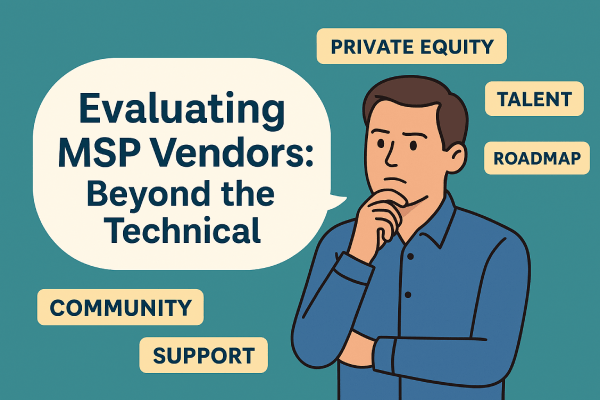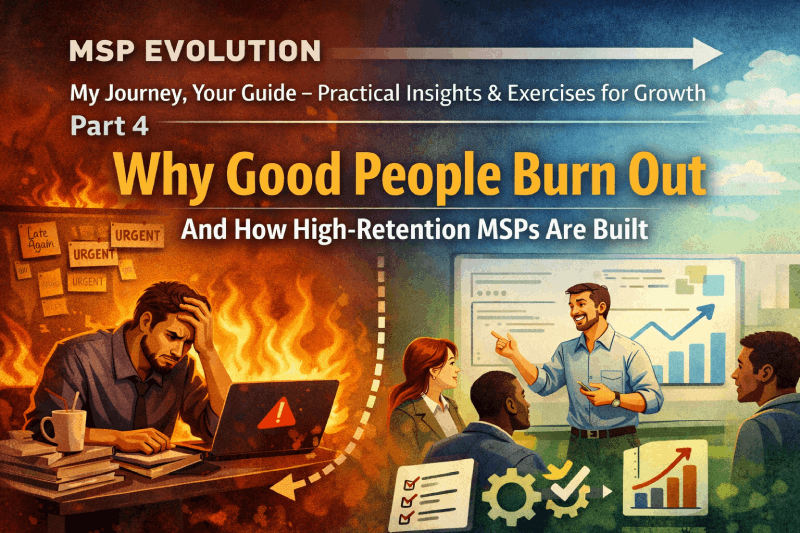This post is going to be subjective. It won’t apply to all companies, and it won’t apply to all people. It’s based on my own experience, and I’d be interested to hear about other people’s experiences too!
If you were to ask me seven or eight years ago what I believe a CTO did in a company, I’d have given you an almost completely different answer than what I would today. My eyes have truly opened since then, and I want to share with you what that journey entailed for me and what I learned along the way. This leads me to what may be some potentially controversial statements!
To truly succeed and grow your MSP as a leader of technology, you need to be a people person first. If you’re not, your business growth may eventually stall
It goes without saying that a technology leader should have good technical skills; I’ll touch on this later. For smaller MSPs where you have only a couple of engineers, or even potentially none, it’s far easier to deprioritise understanding how to lead people. Nearly all your initial output is based on the technical stack you’re building out for your MSP. You can get away with locking yourself in a room and just working on the technical side of your business and no one will bat an eyelid. In my own journey, as my old MSP grew from what was 3 engineers to now 15+, I’ve seen increasingly how important being a good people leader is to growing an MSP. It was an area I lacked in a few years ago. The technical side has always been a strength for me. The leadership side I’ve had to work on. I’ve spent the last few years honing these skills. I’ve read countless books and, with the best guidance I could ever have from the Managing Director of my previous MSP, really worked on how I engage with people.
Here’s what most people don’t realise – you could be the biggest tech wiz on the planet but if you are not leading your teams and the people in them properly then your success is going to be limited as you grow. The reason is simple – the bigger your MSP gets, the more and more technical work there is to do. It gets to a point as the technical lead that it’s not possible for you to do it all, it has to be delegated out. Your teams are not you though and they can’t do the job in the same way you can. Your responsibilities to start to shift from doing the work yourself to building out teams and people that can perform the jobs well and to the right standard. Only then can you scale the company. This means getting your teams onboard. It means inspiring them with a vision and direction. It means building relationships with them based on trust, gratitude, empathy, and respect. It means truly listening to them and taking their thoughts, ideas and concerns onboard. It means effective communication. It means decent training. It means learning how to empower an individual and giving them trust and autonomy in their own area.
Ask yourself this question if you’re lead technology for an MSP – do you enjoy spending time with your staff? Do you enjoy developing people? Do you prefer interacting with staff over spending time in VSCode? If you’re answering no to all or any of these then you may only be able to take your MSP so far.
You need to truly be in touch with your technical skills as well
This feels like a bit of a reverse in direction given my last statement, but it’s completely true. It’s why being a technology leader is such a difficult job.
I’ve had lots of discussions with people on how I keep up with what is probably one of the fastest innovating sectors (technology) that I know of. The answer is again a simple one. The older and more experienced I’ve become, the more I’ve realised how little I actually know. The older I get the more pronounced this becomes. There’s a lot of demanding work involved in being good as an MSP technology leader. You have to keep on top of countless different technologies. I spend many hours a week simply digesting changes in Microsoft 365, security, cloud, hardware, and many other different areas. Being in technology is not a 9-5 job.
What I have found has really helped me is surrounding myself with people who have a similar mindset to me. That is why I am a Managing Partner of MSPGeek, and why I formed MSPsinthe.uk. The more I interacted with other MSPs, the more I learned. The power of community is not just in being able to discuss your problems/approaches and challenges with your peers, but it also serves to digest the most important topics of the day. I have developed so much faster being a part of these communities.
Building up my skills by contributing to open-source projects that solve genuine issues my team are facing (Like CIPP) and sharing countless scripts and blogs have helped me continue to refine, and test, that technical skill.
Having business and commercial sense is critical too
When technology direction is at the forefront of your business, having a keen grasp of the commercials and presenting a vision of the future is critical to help your business succeed in the long run. In most cases, you will be projecting where you think technology is going to shift to and how you need to adapt your clients and your own company to prepare for this. Being able to spot commercial opportunities and understanding how they fit into your overall plan and future will help your MSP grow, and just as importantly it will mean your clients are best positioned with the right technology stack. Do not ignore the sales and commercial side of the business!
Striving for excellence motivates you; striving for perfection is demoralising. Sometimes you just have to say no.
Leading technology is a constant battle of deciding where to spend yours and your organisation’s time. There is always work to be done and thousands of different ways you can improve or enhance your business. Avoiding “Rabbit hole” traps of time is really difficult, especially when you can see that an improvement, fix or innovation is within the realms of possibility to execute. Really dig deep and ask yourself if what you are about to spend time doing is worth it for the business in the long run.
Give up control and instead favour autonomy and trust of your staff
This means not “Gatekeeping” information which is something I’ve observed in people leading technical teams. Gatekeeping information refers to the retention of knowledge by one individual to keep control of an entity (could be a service/program/process/vendor). This can be toxic for a business. As a leader, make it your goal to share any unique knowledge you have in whatever way you see fit. In my old MSP I ran many workshops for staff to help transfer this domain-specific knowledge.
I’m out of MSP land now and working as a Product Lead for NinjaOne, but I am hoping over the coming months to share a lot more about developing, leading and growing MSPs. Stay tuned!







Start the conversation